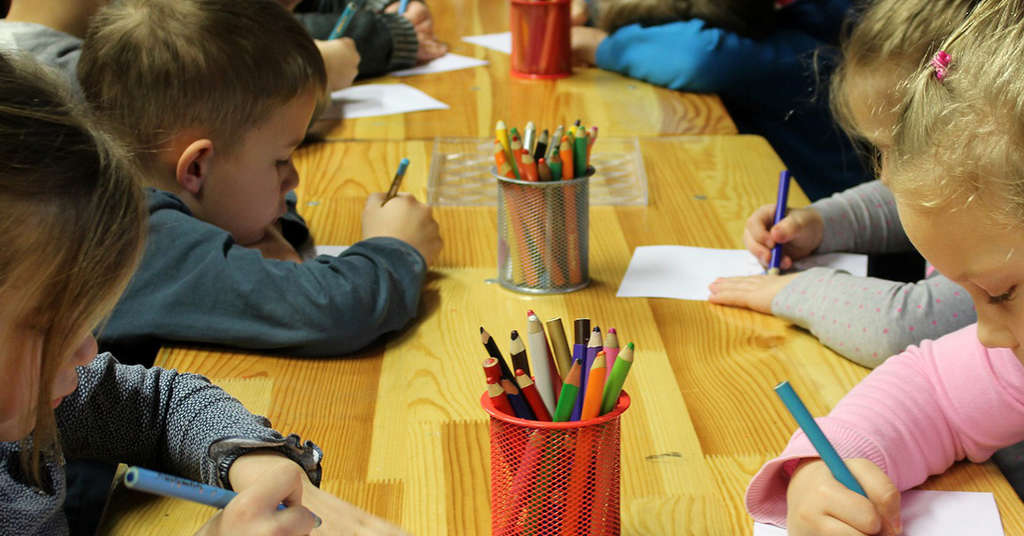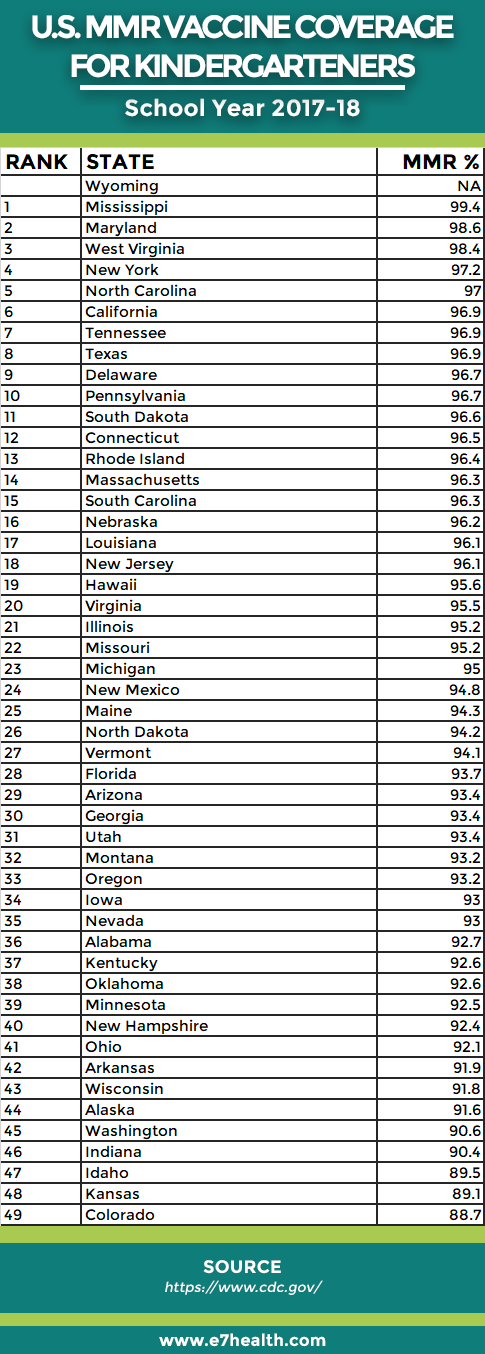Very friendly and super helpful with any questions I had. Very clean and calm atmosphere, all the staff were kind.
Read More
The Best and Worst States for MMR Vaccine Coverage for Kindergarteners
Posted: Oct 17th, 2019 at 08:56PM

According to state law, children are required to get vaccinated before they start attending public schools. However, there are still many cases of unvaccinated – and therefore unprotected – children in several communities within the United States. The recent measles outbreak is an indication of how our complacency has damaged our community's immunity against a disease which was declared to have been eliminated in 2000. Why do we need MMR vaccination? And which states have the highest — and lowest — MMR vaccine coverage among kindergarteners?
2019 has been a bad year for measles in the United States. For the first eight months of 2019 (January 1 to August 29), around 1,234 individual cases of measles have been reported in 31 states, surpassing the country's highest number of measles cases in 1992. Death caused by measles was up by 22% back in 2017 and fear of the vaccine is one of the main reasons behind it.
What is the MMR Vaccine?
The MMR vaccine is a type of vaccine that protects against three types of viruses: measles, mumps, and rubella.
Measles
Measles is an infection characterized by fever, runny nose, coughing, and red, watery eyes, often followed by a skin rash with large flat blotches. Measles can cause complications such as ear infection, bronchitis, pneumonia, and encephalitis.
Mumps
Mumps is a type of infection that usually starts with fever, followed by headaches, a loss of appetite, muscle aches, and swelling of salivary glands. If not handled properly, this could lead to deafness and swelling of the brain.
Rubella
Rubella, or German measles, is another viral infection that's characterized by rashes, sore throat, fever, and headache. This is especially dangerous to pregnant women and their unborn child, as it could cause serious birth defects or miscarriage.
These illnesses are infectious and can spread quickly. If they're not properly handled, these viruses can cause severe health problems.
Aside from the light side effects such as a sore arm (from the shot), fever, temporary stiffness in the joints, mild rash, and extremely rare allergic reaction, the MMR vaccine is considered very safe – much safer, in fact, than catching measles, mumps, or rubella.
Children are recommended to get two doses of the MMR vaccine. The first dose should be taken when the child is between 12 and 15 months old, and the second dose when the child reaches four to six years old.
The Best States for MMR Vaccine Coverage for Kindergarteners
Here are the top states with the highest percentage of MMR vaccine coverage for kindergarteners for the school year 2017 to 2018, according to the CDC.
10. Rhode Island
With a total kindergarten population of 11,025 and an MMR vaccine coverage of 96.4% (which means only 3.6% or a total of 397 children aren't vaccinated), Rhode Island takes the 10th spot in the list. As of September 19, 2019, no measles outbreak in the state has been reported.
9. Connecticut
Connecticut had a total of 39,174 kids enrolled in kindergarten in the school year 2017 to 2018 and a 96.5% MMR vaccine coverage. The state, however, has about 3.5% or 1,371 kindergarteners who aren't vaccinated. The state reported measles cases to CDC in 2019.
8. South Dakota
The state has a total kindergarten population of 12,125 and a 96.6% MMR vaccine coverage, leaving only 3.4% or 412 children between the ages four and six unvaccinated. No measles cases have been reported in the state as of September 19, 2019.
7. Delaware and Pennsylvania
Delaware has 10,988 children enrolled in kindergarten. With a 96.7% MMR vaccine coverage, the state only has 363 unvaccinated children between ages four and six. The state has no reported measles cases as of September 19, 2019.
Also in 7th place is Pennsylvania, with a 96.7% MMR vaccine coverage. However, with its large population of 141,571, this leaves 4,672 kindergarten-age children unprotected from measles. The state reported measles cases in 2019.
6. California, Tennessee, and Texas
California, Tennessee, and Texas have an MMR vaccine coverage of 96.9%, making them the 6th top states with the highest MMR vaccine coverage for kindergarteners.
California has a total kindergarten population of 574,702, which means 3.1% or a total of 17,816 children under the ages four to six aren't vaccinated.
Tennessee, with its total kindergarten population of 78,743, leaves about 2,441 children unprotected from the virus.
Texas' kindergarten population of 387,981, on the other hand, means 3.1% or approximately 12,027 children in kindergarten aren't immune to measles. All three states reported measles cases to CDC in 2019.
5. North Carolina
North Carolina has a total kindergarten population of 127,197 and a 97% MMR coverage. As of September 19, 2019, no measles outbreak has been reported to CDC.
4. New York
New York's MMR coverage of 97.2% makes it the 4th best state when it comes to MMR vaccine coverage. The state has a population of 226,456 and a total of 2.8% or 6,341 unvaccinated kindergarten-age children. Measles cases were reported from New York in 2019.
3. West Virginia
West Virginia has a total kindergarten population of 19,519 and an MMR vaccine coverage of 98.4%. As of September 19, 2019, no measles outbreak has been reported in the state.
2. Maryland
Maryland has a total of 68,528 kindergarten-age children and an MMR vaccine coverage of 98.6%. The state reported cases of measles in 2019.
1. Mississippi
With a 99.4% MMR vaccine coverage, Mississippi ranks first in the list of states with the highest MMR vaccine coverage. The state has a kindergarten population of 39,284. No measles cases were reported as of September 19, 2019.
The recent measles outbreak in the country poses a huge problem for our communities. Germs travel quickly. One person can get infected just because he or she touched the desk that somebody who's ill with the virus used for a short time. One person coughing inside a train can cause 10 (or more) people to get sick. Viruses travel faster than doctors can heal patients. The only way to help prevent this from getting out of hand is through immunization.
There's a lingering problem, though: There are still strong anti-vax communities around the nation.
The 10 Worst States for MMR Vaccine Coverage for Kindergarteners
Here are the states with the lowest percentage of MMR vaccine coverage for kindergarteners for the school year 2017 to 2018, according to the CDC.
10. New Hampshire
New Hampshire, with its 92.4% MMR coverage, gets the 10th spot among the states with the lowest percentage. Measles cases in the state were reported in 2019.
9. Ohio
In 9th place is Ohio, with a 92.1% MMR coverage. Measles outbreaks were also reported from the state in 2019.
8. Arkansas
Arkansas has a 91.9% vaccination rate, making it the 8th lowest U.S. state for MMR vaccination.
7. Wisconsin
Wisconsin comes in at 91.8%, with a total population of 66,178.
6. Alaska
In 6th place is Alaska, with an MMR percentage of 91.6%. There were reported cases of measles in the state in 2019.
5. Washington
Washington reported cases of measles in 2019. The state has a 90.6% MMR percentage, putting it in the 5th spot.
4. Indiana
There were also cases of measles reported in Indiana. They have a 90.4% vaccine coverage.
3. Idaho
Idaho has an 89.5% MMR vaccination rate. There are reported cases of measles in the state.
2. Kansas
The state has an MMR percentage of 89.1%. No cases of measles were reported in the state as of September 19, 2019.
1. Colorado
The state with the worst MMR vaccine coverage is Colorado, at 88.7%. There has been one confirmed case of measles in Colorado as of September 2019.

The Growing Problem of Vaccine Exemptions
While there are no federal laws concerning MMR vaccination, all 50 states have implemented laws that require children to get vaccinated before they attend public schools. These state vaccination requirements have been put into place to prevent the spread of the disease in our country's communities. However, some people are still against getting vaccinated.
There are three reasons for vaccine exemptions: medical, religious, and philosophical. All 50 states allow vaccine exemptions due to medical reasons, 45 states allow children to be exempted from taking the vaccine because of religious reasons, and 15 states consider philosophical reasons valid for vaccine exemptions.
The last two exemptions are currently evolving as states fight to pose stricter limits on them. Too many people can easily use religion and philosophy as their reason for avoiding vaccines. As a result, this can pose a danger not only to the unvaccinated individual but also to the community. As more and more people opt to get exempted, herd immunity becomes weaker.
We need herd immunity to strengthen our community's defenses. Measles and other infectious diseases are less likely to spread if the majority of the people in a community are immune to it. If there is herd immunity, people who can't get the vaccine because of age or health reasons are less susceptible to the disease.
If you're not sure whether you've had the vaccine or not, you can get an MMR titer, which is a type of blood test that checks your immune status. This type of test provides information on the vaccinations you've taken as well as the diseases you've gotten in the past. Therefore, an MMR titer is one that tests for your immunity for measles, mumps, and rubella.
It was only in the year 1989 that the Advisory Committee on Immunization Practices recommended two doses of the MMR vaccine for each individual. People who got vaccinated before that time may or may not have completed the two shots required. Measles, mumps, and the rubella virus are dangerous, and the best way to keep yourself and your loved ones safe is by making sure that you're vaccinated.
To protect children (and the community) from getting infected by the virus, getting the MMR vaccine is essential. The more people we have immune to the virus, the better the chances of preventing further outbreaks.

I came to E7 health for a physical exam for employment. Staff was very professional, And I was in and out in thirty minutes
Read More
Staff was extremely friendly, I was able to walk in without an appointment.
Read More
Very friendly, informative, and well versed. Felt well taken care of by the doctor and all the staff. Fast, friendly, considerate, all staff met.
Read More
I was here for an employment physical. They are amazing! I was in and out in less than 10 mins.
Read More
J was super helpful. Very quick and easy.
Read More
Rachel was amazing and I was in and out so quick ! Ready to start my new job ! Thanks 🥰
Read More
J was awesome at talking me through my first time getting blood taken. The doctor that also did my physical was quick and very thorough when letting me know the next steps for getting the test results back :)
Read More
















